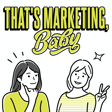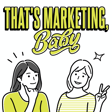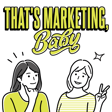Become a Creator today!Start creating today - Share your story with the world!
Start for free
00:00:00
00:00:01

How Social Media Has Totally Changed the Rules of Brand Management
Social media and the 24/7 news cycle has completely reshaped PR, brand reputation, and company credibility.
In this episode, Jess and Susan discuss the complexities of modern brand management, specifically the importance of documenting what you will NOT say or do.
In this Episode:
- Brand messaging and navigating competition
- Reputation management with social media at the center
- Tips for building and maintaining trust with your audience
That's Marketing, Baby is produced by Sweet Fish Media. Book a call at sweetfishmedia.com.
Transcript
The Changing Landscape of Brand Management
00:00:00
Speaker
It's hard. It's hard at every move to think, is this going to tarnish the brand? But it's very important to consider that in like your actions and and and what you're doing, especially in this age of like, you do not control your own narrative anymore. Things that used to be handled more behind closed doors back in the day, but you've got tech talkers that are posting how they're getting fired. They're showing how heartless the whole thing is. It's like, I think that there's just like been this whole new level of how people perceive brands that they don't manage anymore.
00:00:31
Speaker
Welcome to That's Marketing, Baby, the weekly show where two marketing besties talk all things marketing in the world of B2B and B2C. I'm your co-host, Susan Wenegrad, and I've spent over 20 years in marketing focusing on paid media and email marketing. And I'm Jess Cook, copywriter and creative director turned content marketer. Every week, we'll tackle a topic that's on our minds and hopefully yours too. Ready? Let's go.
00:00:59
Speaker
Hey, everybody. Welcome back to That's Marketing Baby for an exciting part two conclusion to our previous discussion.
Content Media: What Not To Do?
00:01:06
Speaker
I am Susan Winograd, and I'm here with my fantastic co-host, Jess Cook. So we spent the last episode talking about when not to do things in content media. um I think we we talk a lot about how to do things right and what to do and what not to do. But a big part of that is what to say no to, what types of content to say no to, what to say no to with media spend. um And there was kind of, as we went through it, there was this whole topic that felt like really a separate discussion because I think it's become such a big thing, especially because of social media and how accessible and how you know quick things happen. And everybody's, you know, all these brands have Twitter accounts now. And so it's this whole sphere of the public perception of your brand and, you know, say no to things that would do the following. So we have sort of a list.
00:01:55
Speaker
that really revolves around you know your your messaging, your credibility, the relationship you have with your competitors. And it just the more we looked at it, the more we thought, you know these are all really interrelated and really tie back to brand public perception.
The Role of Social Media in Brand Perception
00:02:09
Speaker
So we felt like this was a worthy separate discussion just because this feels like it starts to stray into sort of like the PR type content and how you handle things, like things that used to be handled probably more behind closed doors back in the day. It's all I mean, you know, you've got tech talkers that are posting how they're getting fired, right? Or they're getting layoffs, they're recording them and they're they're showing how heartless the whole thing is. It's like, so there's I think that there's just like been this whole new
00:02:34
Speaker
level of how people perceive brands that they don't manage anymore. And it just opened up this really interesting discussion with you and me about like what does that look like? How do you combat that? How do you manage it? And so this just felt like you know related to the last episode of like what not to do, but it also felt like a ah topic we could tackle on its own. So that's what we're doing today. Yeah. and And one extra point I want to add to that is like what not to do and how to and why that's important to build that what not to do into your strategy. You need something to be able to point back to, something documented that says, like this is who we're not going to talk to. This is where we're not going to you know promote things. i These are the types of words we're not going to say. this is you know I mean, write down... When to not run your media for a couple of days.
00:03:22
Speaker
but Right, exactly. yeah Right down to like even just a style guide, right? like We don't use exclamation points for this reason. I mean, it it can get very deep and detailed. It feels like an overlooked part of strategy, but a really important part of strategy. like What are you going to exclude intentionally?
Maintaining Brand Integrity
00:03:41
Speaker
So this half, like Susan said, very much about like brand trust, brand awareness, brand integrity. And the first one is you know it's just not a fit for your brand. right There are certain things that inherently because of the brand that you're trying to build and the characteristics and and qualities that you want your brand to portray, doing something or saying something a certain way just like would not work.
00:04:09
Speaker
right um And so there are all kinds of examples of this. Again, right just right down to the vocabulary you use, the tone of voice that you have, um the history of your brand. I mean, there are certain things that Coke just isn't going to do right because it's just built such a legend you know over the past 100 some odd years that like there's just things that like they don't have they don't have to do or they're not going to do because they're coke. If you think about it, this is also kind of a content problem that you run into at TV shows when they're on for long enough.
00:04:48
Speaker
It's like you come to expect certain things from them and then they'll get different writers. It's always like the running thing where it's like when they run out start running out of storyline, someone has to get pregnant and have a baby, right? And you're just kind of like, that's never what the show was about. And some some shows managed to do it skillfully, but it's pretty rare. They feel like, I mean, you run into the problem of like, yeah, it feels stale, but it's also what you're known for and why you're beloved. So it's sort of the same problem where it's like, when all of a sudden someone just decides to completely change their brand image or, and ah you know, artists can do whatever they want. It's their identity, but it's it's kind of the same thing. We're like, there's a shock to the system. And you're just, I mean, like, look at Will Smith, right? I mean, that did not. That was not what we had come to expect from his personal brand. right and Look at what's happened since. i mean it's They definitely went on a PR craze because there were a lot of Will Smith movie movies on. All over the summer, on ah every flight I took, there were like old-school Will Smith movies. The PR machine was working furiously, but that's kind of an you know an example of like when there's a consistency of personality that someone expects,
00:05:55
Speaker
And then it's completely, it just feels like it comes out of left field.
Influencers and Brand Alignment
00:05:58
Speaker
People immediately get distressed because they're like, were you that way the whole time? Or like, what is this? Are you changing? Am I not going to like you anymore? It makes people very unsure. This is a really good point you bring up of like the influencers you choose, right? Like who are you going to align yourself with that feels right for the brand that exemplifies the same values that you do, right? That, um, And, and that's going to be very different for liquid death than it is for like, um, I don't know, the honest company or something. Yeah. Tom's shoes. Right. Yeah. The honest company. Right. So it's very much a case by case basis. You just really have to understand like, what is it that your brand stands for?
00:06:40
Speaker
and Because of that, what are the types of content you're going to put out, the types of people you're going to align yourself with, the places where you're going to run media, even? like Oh, yeah. That's definite been a big problem. Because there was the, what group was it? Sleeping Giants or something a couple of years ago? and you know they would They would publicly call out companies. And I kind of felt bad for some of the companies because they didn't even know it was happening. like They were just in a run of network banner buy. And like they didn't know they were showing up on like crazy you know like really
00:07:11
Speaker
mean site Yeah, Alex Jones podcast. Yeah, like they didn't they didn't they didn't know they weren't watching closely. You know what I mean? It's like it's not like they went in and picked that placement. So it that's the kind of stuff too. It's like it might not even be things that you're aware of that can, you know, become a problem. Yeah, so diligence. Alright, the next one, it would dilute your brand message. And I think this actually this ties back into what we spoke about in part one. if an idea is not novel or niche or broad or unique enough, right? Like it has to kind of fit within your wheelhouse, but it also has to fit within the core of what it is that you're known for, right? I think that's where a lot of brands kind of, um I don't know, the wheels start to fall off as they start to talk about things that like people are like, why are they talking about that? Like that is a weird thing for them to,
00:08:08
Speaker
You know, this is kind of what happened to JC Penney. Yes. Because they their core customer group was fanatical about their coupons and, you know, like their whole savings structure. And they brought in, I think they were like an Apple executive, if I recall correctly, they wiped out that entire program and they just made it like flat sale pricing and the immediate perception of them changed. And they've they've never recovered from it. Like they never, and granted that's like promotional messaging, but it's still content, right? It's still like they were trying to spin it. Like it's a newer, simpler JC Penney. And like everyone was like, but I like have like feeling devious. Like I'm getting that they didn't feel like they were getting as good of a deal because they're like, they're offering it to everybody. So.
00:08:46
Speaker
you know what i mean it's like it i mean It would be like Kohl's not having Kohl's cash. know it's like You just don't do that. You think about B2B, it's like what are the topics we're going to touch on and what are the things we're just not going to touch on because it it would just like water down the things we are going to talk on.
Strategic Brand Rivalries: Are They Worth It?
00:09:05
Speaker
It's so tangential to what we do. It's so in the periphery. It would start a war with competitors. This one is really interesting to me so because I think for some brands, that might actually signal something they would do. Yeah. If they're known for being like a feisty, you know i butt i made it but it has to be part of your brand, then people kind of expect it and it's kind of fun. Was it Wendy's always had a really great Twitter? like were they just wendy's Yeah, they just are like sarcastic with everybody. and I think the other point of that too is that it's like,
00:09:36
Speaker
It's almost like with South Park, like they're going to offend everybody. right like They're not picking on one competitor, they're just like sarcastic with everybody. right And I think that's the other difference too, is that like knowing that that's part of the brand makes a difference versus when you just step on a landline. How you like your burgers, that is a very subjective like thing, right? Like there are a lot of people who like love Wendy's over all of the others. And there are people who are like, I don't like Wendy's and I don't actually care if they say they're better than everyone else or they pick fights with everybody because I'm still going to go to Burger King or whatever.
00:10:10
Speaker
When you get to B2B, there are actual features and like business impact that people can point to to say, no, actually you're wrong. This is better, right? Like the risk becomes a lot higher when you're starting a war or picking a fight with a competitor. So you really- That's a good point. Fertile ground for lawsuits is what it is. I've watched it happen. um And so you really have to be careful like how are we gonna word this in a way that kind of doesn't doesn't draw that attack but still positions us as like a new and better way so so really thinking about like what is the line that you are just not willing to cross um and and making that part of your strategy.
00:10:56
Speaker
Because I have absolutely had someone come to me and be like, we need to create a competitor, like a page where it's like, we're better at this, we're better at this, we're better at this, we're better at this. A lot of companies do that. like That is a big part of their SEO strategy, right? um Some, like it's just not worth it at that certain point in their you know growth trajectory or whatever. So you really have to figure that out strategy level. Are we going to go there or are we not? Hey, I want to take a quick second to tell you about our friends at Sweetfish. Content marketers, just a friendly reminder, your job is not to hook the 3% of your audience who are ready to buy. It's to pique the interest of the 97% of your audience who are not ready to buy yet. With compelling stories,
00:11:41
Speaker
Interesting points of view and practical advice that helps them be better at their jobs. And that is where Sweetfish comes in. Sweetfish is a podcasting agency that can help you power a modern top of funnel content flywheel, all to grow that 97% piece of pie into the largest queue of future buyers possible. How do I know all of this? Sweetfish is the official podcasting agency of that's marketing baby. So we're big fans over here. Book a call with them at sweet fish media.com today. So when the 97% are ready to buy, they buy from you.
Managing PR Crises in the Social Media Era
00:12:14
Speaker
Okay. Back to the show. If you're going to walk into note and doing it knowingly, you better make sure your house is super spotless.
00:12:23
Speaker
Because they will find everything. And they will run it on ads. They don't even have to say your name. like That's the other part of people as well. But I'm like, they won't have to say your name. That's the thing. And it's like, you have a much harder time doing anything on the platforms to get them to stop. Um, so that's kind of the other thing is like the minute you do that, you are opening yourself up. So like, unless your house is thick and span, squeaky clean, you're, you're throwing a bomb in the middle of it. And I've seen this happen a lot. Um, even in just like localized interest, I see it happen a lot with law firms where they are highly competitive. They bid on each other's names and they play chicken about it. Where one's like, will you stop first and I'll stop. they're Like, will you stop first and I'll stop. Right? So it's kind of like, there's, there's some of that going on where it's like, stop bidding on my name and I'll stop bidding on yours.
00:13:10
Speaker
There's sometimes there's just like, quote unquote, gentlemen's or gentle woman's agreements between competitors that they won't do that. um But it's it's hard. I mean, it's like, it's, you know, they they they can bid on your name all they want. um So you just if you do do that, you have to be really careful about what you decide to say in that ad. So if your if your ad shows up for someone that search for your competitor, you better be really careful about what you say in there, because they're going to find out. um It's not it's not going to go unnoticed. So And then you know once that war starts, and this kind of i think leads into our next point, which is about tarnishing your brand's credibility.
00:13:45
Speaker
it you know I've had PR crises where they're like, stop all the media now. right Because it's like if it keeps running, especially if it's like Facebook, everyone will start commenting and you cannot put that genie back in the bottle. um it's you know Once you've got a PR problem on your hands, once there's an open forum on especially social where people can comment on it, You got to get all that off there right now. And the other problem is once those comments start infecting your ads, you can't run them anymore. I mean, you can try and disable the comments or get rid of them or whatever, but it's like that creative is now toast. You're going to have to start it all over once the wave subsides. So there's a lot of, um you know, there's just a lot of ripple effects for that stuff that lasts longer than the moment that it happens.
00:14:28
Speaker
This would go back to um as well, where your media runs, right? Like being very diligent, or just diligent about knowing, you know, okay, this we've chosen this ad network, like where is this going to show up? And do do all of those places align? And is this what we really want to do, right? um Because something as simple as that. keep I would say like keep a block list of placements that you know you upload into everything that you run. you know So it's like every time you're running on, if you're going to be running anywhere on Google, it's like there's just an account-wide placement negative list that exists, and you add to it as stuff comes up, right? It's like just that way you don't even have to think about it. But most places don't think about it. you know it's like or it's it's
00:15:14
Speaker
It's also hard if it's just like weird niche like YouTube channels you wouldn't know about but that have like really weird cult followings. like You would never know because you'd see the name and you're like, okay, whatever. It's some guy, maybe he's fixing his car or something. Then you're like, oh no, he's some completely you know crazy anarchist that wants to like overthrow the entire world. like You don't know by the name of it. YouTube's another one that you kind of have to be careful about um from a credibility perspective because I feel like it can be harder to catch those channels sometimes than it is to capture you know catch those websites that do it. Here's an example that just popped up last couple of days. Chick-fil-A had ah this an employee, a Chick-fil-A employee who of her own accord with with no kind of partnership with Chick-fil-A was reviewing Chick-fil-A menu items and and you know doing a great job. um She had ah a good number of followers, like people liked her content.
00:16:07
Speaker
And Chick-fil-A asked her to stop. Chick-fil-A is supposed to be this place where like they have the best trained employees, they have the friendliest employees, they are a great place to work for their employees. And that what they did with her is at odds with what they're trying to stand for. And Shake Shack saw this as a great opportunity to swoop in and say, well, if Chick-fil-A won't let you, we'd love to partner with you. Here, we're going to give you some stuff you can taste as. You tell people about it, right? She's a fast food influencer now. Exactly. So here is a Chick-fil-A employee who now has a social ah content creator contract with Shake Shack and like good on them for swooping in. So smart.
00:16:51
Speaker
Right. And, and so now like one brand's kind of like downfall or like, you know, slip in credibility and kind of what they stand for is like another person's opportunity. So, you know, just, it's, it's hard. It's hard at every move to think like, is this going to tarnish the brand? But it's very important, um, to consider that in like your actions and, and, and what you're doing, especially in this age of like everyone, you do not control your own narrative anymore. Um, in the age of social media. Now, and I think that kind of leads into our last point.
Internal Communications and Executive Oversight
00:17:25
Speaker
And I feel like Facebook is the poster child for this, but diminishing public or investor trust because of things. And I feel like this kind of starts, it might not just be the content at this point. It's like, it's even, I mean, we're finding that like, viable content is anything that's posted internally at a company. i mean look at Look at all the stuff that came out, all the email content from Google in the discovery process where they had emails that basically said, raise the auction prices because we have to meet you know stock expectations. or you know It's like that stuff has even become fair game for content at this point. so
00:18:03
Speaker
that's kind of the other thing too, is that I think it was always about like, what are we putting out deliberately? And like, even Chick-fil-A probably didn't, it didn't occur to them that she could publicly be like, they told me to stop, right? So it's like, it's that internal communication piece. It's the Tik Tokers, you know, recording how they're getting laid off and how they're never given any reason. And there's like zero compassion and there's like no severance. um All of that is is fair game now, which I think is interesting to watch because that's the stuff that starts to impact um, you know, shareholder value and their perception of you and the perception of who's running the company and you have a board involved and it it gets really, really complicated. Like everything is decision by committee. And if you lose the faith of that committee, it's tough. So I think it's really on like marketing to give people those tools, give people the guidance
00:18:52
Speaker
but you know put them through training, show them times where like, ah this thing happened. and like you know um And I think the higher up somebody is, the more important that training, right? um I think you know founders can go off and say things that are like, you know oh man. I mean, look at Twitter, right? like Oh my God, I know. I know. I mean, there's there's no one governing that ship. its I mean, I've been at places where, you know, i I was at an annual meeting and the CEO went off script and the PR girl's behind me. She's like, Oh my God. no No, no, no, no, no, no. Like I heard her saying that. She's like, Oh my gosh, she's goingnna alienate him they're gonna he's gonna alienate them. Like I could hear her saying it under her breath. So that's the hard part too, is that it's like, I think
00:19:34
Speaker
the higher up it is, sometimes the harder it is to corral if there's not a buffer. Like if they don't have a designated person that they go through, I think it's really easy for them to kind of step in it. Sometimes unintentionally, it might be no bad, you know, nothing was meant by it, but it's just, they don't know how to think three steps ahead. You know, it's like they're kind of just thinking about the business as it exists. They're not really thinking about the humans that are perceiving what they're saying. um That can be a challenge. This is um the importance of a good comms team. Like you really help hone and craft some of that. It is an art form for sure. Yeah. One other thing I just thought of is like, um you know, we we talked a lot of in in quite a few of these about like where your media runs. I would also look at which events you are participating in. like
00:20:22
Speaker
Who is behind them and what do they stand for? right um That is a big thing to look at. like who is Who's running these events and like what's their agenda and do we align with that? That's another place to look too, besides media. um a similar kind of A similar due diligence needs to be done there. Yeah, there was there was a big problem with that like in the you know mid to late 2000s in the SEO industry because it was it was very heavily male run. And so the the conferences became known for just like strip clubs and like all this kind of stuff that yeah that made women feel like, I don't want to go to that. And so the thing was, as the industry grew, you know and it grew beyond that original core group that were primarily men, that was when it was kind of like, everyone was like, well, I don't want to go to those conferences. I don't want to speak at those because I'm just going to be uncomfortable.
00:21:10
Speaker
right So it was kind of like that reckoning had to happen of like, okay, we're not the same industry we
Event Participation: Aligning with Brand Values
00:21:15
Speaker
were. If we want you that if these things are going to grow, we need to be more inclusive. right So sometimes brands have to look at like what perception they're giving off um to make sure that it's it's actually what they want to your point based on like what they're doing. are they at you know some conferences just known to be a a big great big party and it's not really anything else. And it's like, if that's someone's jam, that's great. But you're known for that. Just understand what you're you're missing out on or what you're tuning off. you know And it could be youre you're deliberately saying no to those attendees. like That could be it. But to your point, just be aware of that. Imagine being um ah a company that was sponsoring that event and and and all of a sudden, like
00:21:53
Speaker
you are now sponsoring kind of this environment that's making women uncomfortable. like Those are the types of things you really have to look at. like what How is this being run and and you know what are kind of the values of the the people behind
Engagement and Further Discussion
00:22:06
Speaker
that? I think we have covered the gamut of things to say no to and why. and i think i I think we left no stone unturned. i mean If we if we I forgot anything. Please hit us up on LinkedIn. We'd love to discuss it further. I mean, if there's other reasons, I'd love to hear them because this was a super interesting topic for us to to unpack. Yeah. I'd love to hear more reasons. Yeah. Tell us your reason. We'd love to hear examples of like, we exclude this type of content or whatever because of this, right? like that is
00:22:37
Speaker
That's why we're here. Let's start a conversation, people. Exactly. I didn't just stop talking on a microphone. No one needs to hear any more of us. We'd like to hear from you. so um Well, thank you guys for joining us once again. We are so happy to be back on ah on a regular schedule. We missed everybody. And yeah, that's it for this week. That's Marketing Baby. That's Marketing Baby. See you next time. Bye-bye. Thanks for listening to That's Marketing, Baby. If you dig what we're putting down, be sure to subscribe and share with your marketing besties, because hot marketers don't gatekeep. If you're like, this is not enough, I need more, we got you. Ransom Raves is the official newsletter of That's Marketing, Baby. Every week, Susan and I share one thing we love and loathe in the world of marketing. Get on the list at thatsmarketingbaby dot.com. Okay. Bye. Bye.





